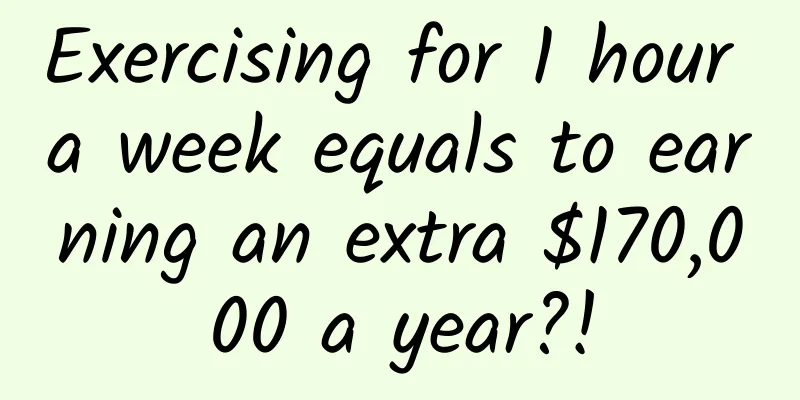Exercising for 1 hour a week equals to earning an extra $170,000 a year?!

|
Are you curious about the difference between those who exercise regularly and those who never exercise? Previously, the topic of " Persistent exercise is equivalent to earning an extra 170,000 yuan a year " has sparked heated discussions on the Internet. What is going on? Let's take a look → This conclusion comes from a 2018 Yale University study that investigated the mental health of more than 1.2 million adults. The results showed that even just one hour of exercise per week can significantly alleviate depression symptoms. What's even more surprising is that the positive emotional value of sticking to exercise, converted into economic benefits, is equivalent to earning an extra 170,000 yuan a year, or the equivalent of getting an extra college degree! The study covered 75 types of exercise, including team sports, cycling, aerobics or gymnastics, running or jogging, recreational sports, winter sports, pool classes, walking and more. The results show that the positive impact of exercise on mental health even exceeds factors such as age, income and education level. In other words, no matter how old you are, no matter what your economic conditions are, no matter what your educational background is, exercise can make you feel good. What are the differences between people who exercise regularly and those who never exercise? 1. Better muscle mass When people reach middle age, they begin to lose muscle, especially when they enter old age, their athletic ability declines significantly, and their legs and feet are not as flexible as when they were young. However, those who insist on exercising can maintain better muscle condition, with more muscle content and less subcutaneous fat. 2. Better cardiopulmonary function The heart and lungs are vital organs in our body. Experts point out that regular exercise can strengthen the respiratory muscles, improve the elasticity of the lungs, improve lung function, and make the heart beat more powerfully and regularly, which helps prevent the occurrence of cardiovascular diseases. Zeqiao original copyright contact 3. Stronger bones and joints People who keep exercising usually have much better bones and joints than those who do not exercise. Exercise can promote blood circulation in bones, enhance metabolism and make bones stronger. At the same time, exercise can also increase the strength of muscles around joints and improve joint stability and flexibility. This means that people who keep exercising have a lower risk of injury in daily activities and relatively fewer problems such as joint pain. Zeqiao original copyright contact 4. Better metabolic function Regular physical activity helps improve the body's metabolic environment and reduce the risk of diabetes and metabolic syndrome. 5. Better cognitive abilities Many people have had this experience: after exercising, the whole person seems to become refreshed and in a much better mood. This is because exercise can promote the secretion of endorphins in brain cells, which is a natural "happiness hormone". Not only that, but studies have shown that regular exercise can boost brain health and prevent cognitive decline that occurs with age. 6. Better sleep quality Moderate exercise can help improve sleep quality. For those who often suffer from insomnia, regular activities such as running, gymnastics or Tai Chi can regulate the nervous system and fundamentally eliminate insomnia. 7. Stronger immunity " Exercise is good medicine " is not without reason. Long-term exercise can enhance the body's immunity, making the body healthier and less prone to illness. 8. Thinner and more elegant Exercise not only helps to lose weight, but also strengthens muscles throughout the body, shapes a better body shape and posture, and makes people appear more confident and beautiful. How long is the best time to exercise? So, how should we exercise to achieve the best health effects? Studies have shown that exercise duration between 30-60 minutes is highly correlated with mental health benefits, with a peak at around 45 minutes. If the exercise time exceeds 90 minutes, the mental health benefits will be reduced; if it exceeds 3 hours, it may even have a negative impact. Therefore, 45 minutes of moderate-intensity exercise is the most cost-effective option. Although you may not see the difference at first, as time goes by, the gap between those who exercise and those who don't will become more and more obvious. So, even if you only take a little time every day to do some simple exercise , I believe you will see the changes in yourself soon. |
<<: Eater, do you know what you are eating?
Recommend
What is the reason for high FSH
Women's uterine and ovarian health will chang...
Does leucorrhea after ovulation mean pregnancy?
Leucorrhea is a normal physiological phenomenon f...
What foods are good for your health when your period is coming?
Regarding the maintenance of women's menstrua...
What is causing the pain in my left breast?
Today I want to talk about a common problem among...
What tests do women need to do?
Because the female urinary system is relatively s...
"Ginger soaked in vinegar" can nourish the stomach, lose weight and remove dampness? Don't believe it anymore
Rumor: "'Ginger soaked in vinegar' c...
Can poor sleep trigger Alzheimer's disease?
Alzheimer's disease (AD) is the fifth leading...
Fallopian tube suture
Sterilization surgery is a relatively common cont...
Will a cold during five months of pregnancy have any impact on the fetus?
It is very common to have cold symptoms during pr...
What positions are suitable for pregnant women to have sex
Although pregnancy is a very dangerous stage, cou...
Will smoking make a woman's breasts smaller?
Many people know that smoking is good for health....
Why use sanitary napkins?
Girls do not need to use sanitary napkins when th...
What are the symptoms of gastroenteritis in women
Gastroenteritis is a common and frequently occurr...
As long as these two examination indicators are normal, there is basically no major problem with your liver!
Clinically, as long as you don’t have viral liver...
A brief discussion on how many days after menstruation is the ovulation period
Modern women are prone to infertility, which is a...









